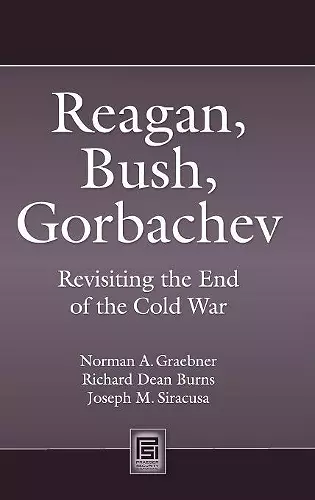Reagan, Bush, Gorbachev
Revisiting the End of the Cold War
Richard Dean Burns author Joseph M Siracusa author Norman A Graebner author
Format:Hardback
Publisher:Bloomsbury Publishing PLC
Published:30th Jun '08
Currently unavailable, and unfortunately no date known when it will be back

This book examines the end of the Cold War and the decline of ardent anticommunist ideologies in the United States. It chronicles the evolution of the political relationship between Reagan and Mikhail Gorbachev and that relationship's role in ending the Cold War.
This work is a contemporary chronicle of the Cold War and offers an analysis of policy and rhetoric of the United States and Soviet Union during the 1980s.
This work is a contemporary chronicle of the Cold War and offers an analysis of policy and rhetoric of the United States and Soviet Union during the 1980s. The authors examine the assumptions that drove political decisions and the rhetoric that defined the relationship as the Soviet Union began to implode. This work demonstrates that while the subsequent unraveling of the Soviet empire was an unintended side effect of Mikhail Gorbachev's reforms, termination of the Cold War was not. Ronald Reagan deserves full credit for recognizing Gorbachev's sincerity and his determination to change the direction of Soviet policies. For this, Reagan felt the full wrath of anticommunist hawks for doing business with a communist leader. But it was Gorbachev who concluded the superpowers had become mesmerized by ideological myths which ruled out any meaningful discussions of a possible accommodation of political issues for more than four decades. The evidence is compelling that Gorbachev himself broke the Cold War's ideological straight jacket that had paralyzed Moscow and Washington's ability to resolve their differences. Though politically weakened, Gorbachev conceded nothing to U.S. military superiority. Never did he negotiate from a position of weakness. In doing so, the last Soviet leader faced even greater political and physical risk. Without Gorbachev the end of the Cold War could have played out very differently and perhaps with great danThree distinguished traditional diplomatic historians joined forces to produce this exceptional chronicle of the fall of the Soviet Union and the end of the Cold War. While it breaks no new research ground, it is narrative history at its best, full of insightful interpretations delivered in a most readable format….Undoubtedly, as archives open up, new insights and interpretations will emerge, but for the moment this is the best accounting available….Recommended. All readership levels. * Choice *
It is in that sense an argument against the ideological vision that drove the Reagan administration and the construction of erroneous policies, particularly in regional conflicts in Central America. For these reasons. if not the originality of content, the book deserves a close reading among the current trends in the literature and cultural reconstructions of the Reagan administration. * International Affairs *
ISBN: 9780313352416
Dimensions: unknown
Weight: 425g
188 pages